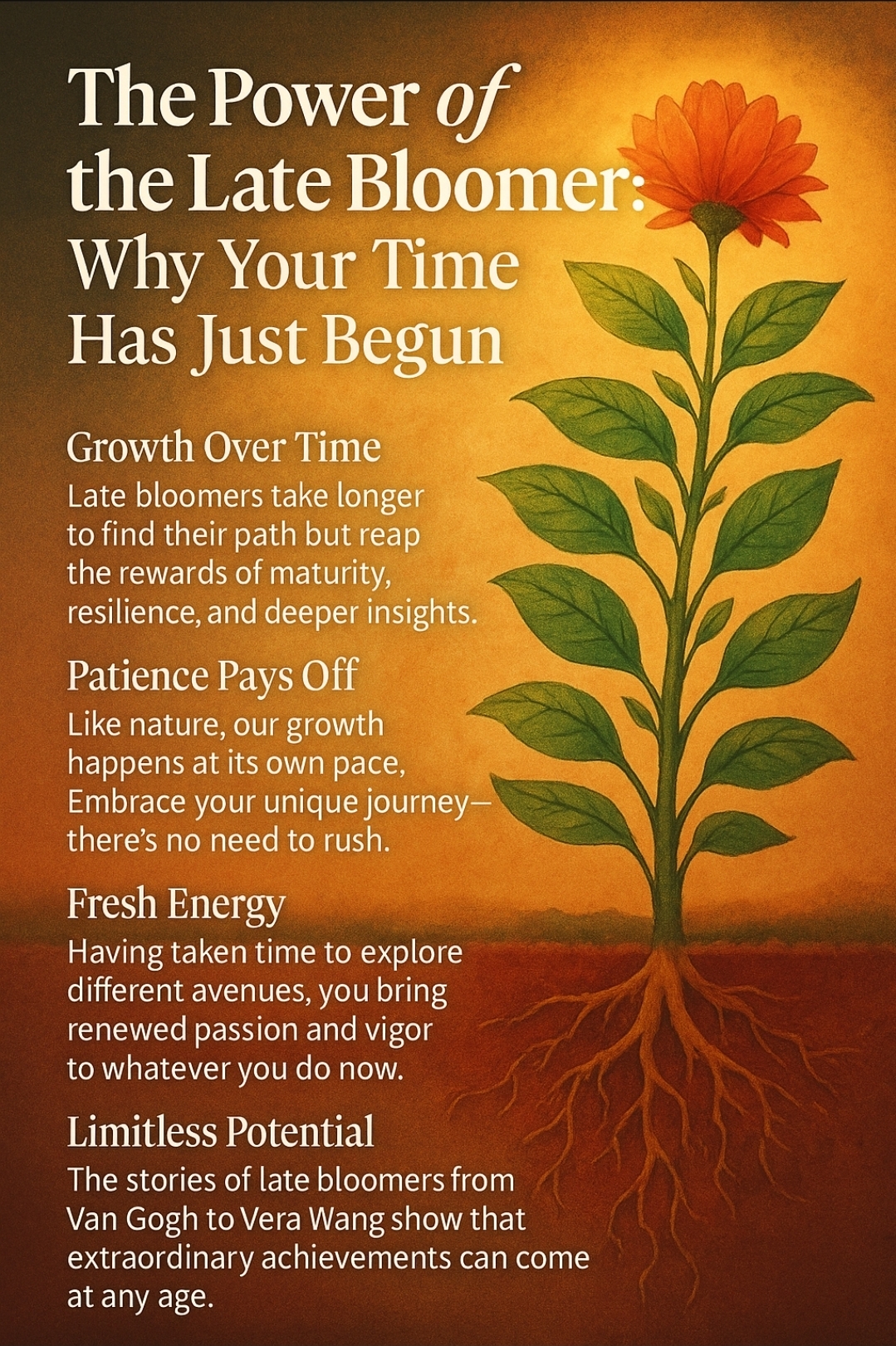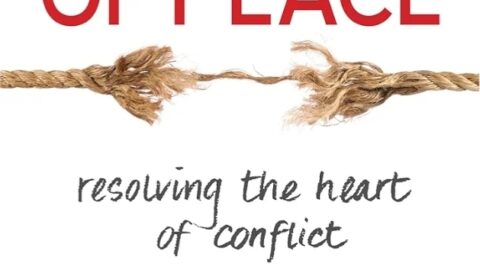“Strength and growth can only come through continuous effort and struggle.” – Napoleon Hill
For decades, society has whispered a lie into our ears: if you haven’t “made it” by 30, you’re already behind. The world glorifies youthful billionaires, viral fame, and the illusion that success is a sprint. Yet for many, those years of racing are not wasted years but formative years—decades spent forging resilience, depth, and wisdom that cannot be faked.
The truth is simple: you are not late. You are right on time.
The Lie of Expiration
From Hollywood’s obsession with youth to the tech industry’s idolization of twenty-something moguls, a quiet narrative has been reinforced everywhere: your prime is over before it begins. Family dinners, job applications, and casual conversations echo the same message—ambition has an expiration date.
But who decided life must peak in youth? Why should the most impactful ideas, deepest insights, and strongest convictions be confined to an age before the brain is even fully matured? This is fiction, sold as fact. And too many have bought it.
Youthful Success vs. Mature Power
Youth has energy, yes. But it also carries inexperience, fragile identities, and dependency on external validation. Many who succeed early flame out quickly because they built for applause, not substance.
Late bloomers, however, move differently. They’ve already tasted rejection, invisibility, and failure. They don’t build for attention; they build for depth. Their strength is quiet, their roots deep, their clarity forged not in hype but in silence.
Examples of the Late Blooming Flame
- Colonel Sanders was 65 when he founded KFC after failing at multiple careers.
- Vera Wang designed her first dress at 40, after working as a skater, journalist, and editor.
- Antonio, a plumber fired at 48, rebranded himself as a “leak prevention strategist,” rebuilt his business, and transformed his identity.
These lives remind us: they didn’t bloom late. They bloomed when they were ready.
The War Within: Programming and Auto-Suggestion
The loudest enemy is not the world—it’s the script running in your mind: “I’m too old. That ship has sailed. It’s too late.” Napoleon Hill called this the “law of cosmic habit force”—repeated thoughts become internal law.
Most of us have spent years rehearsing limitations until they became our identity. But repetition cuts both ways. New scripts—“I’m not late, I’m right on time. My scars are experience. My delays are depth”—may feel fake at first, but that’s how new programming always begins. Fake is not delusion; fake is the first step toward familiarity.
Environment: The Silent Sculptor
Your environment speaks into your subconscious every day. Toxic environments rarely announce themselves—they sound like “realism.” “At our age, you can’t expect that anymore. Be grateful for what you have. It’s too late to start over.”
But every conversation tolerated is a seed planted. If you’re not vigilant, you’ll wake up one day in a garden of beliefs you never chose but inherited. Protecting your growth means guarding your energy. Setting boundaries is not cruelty; it’s survival.
The Death of Nostalgia
One of the most subtle traps is nostalgia. It ties you to a version of yourself that never fully existed. Old photos, old playlists, old stories—what you miss isn’t the past, but the naïve version of yourself who still believed.
But that version can’t take you where you’re going. True growth requires grief: thanking the old self for getting you this far, then releasing it so you can step into who you’re becoming.
The Void: Where Transformation Happens
Between the death of the old self and the birth of the new lies the void—an identity limbo with no applause, no recognition, no spotlight. It feels like disappearance, but it is sacred construction. Like a seed underground, unseen but alive, this stage is the birthplace of authentic transformation.
History’s great changemakers disappeared before they returned unrecognizable. So too must you endure silence before emergence.
The Calling of the Late Bloomer
In a world drowning in noise and speed, the late bloomer arrives as a recalibrator. Their fire does not scream—it simmers with conviction. They do not seek virality; they seek legacy. They are not driven by applause; they are answering a calling.
Early success is about proving yourself. Late blooming is about offering yourself. And offering is where legacy is born.
Time Is Not the Enemy—Comfort Is
The greatest trap is not time but comfort. Time refines; comfort decays. Real transformation begins when the inside matches the outside—when coherence replaces performance.
So if you are quiet now, if you are off the radar, if no one sees the work you’re doing—good. Stay there. Let silence be your strategy. Let obscurity forge your foundation. Because when you return, you will not be noticed. You will be unavoidable.
You are not late. You are refined. You are not behind. You are becoming.
Here’s a point-by-point breakdown of the transcript:
1. Opening Frame
- Quote from Napoleon Hill: “Strength and growth can only come through continuous effort and struggle.”
- The setup: society believes if you haven’t “made it” by 30, you’re finished.
- This is called “realism” but functions as condemnation.
2. The Quiet Condemnation of Age
- Internalization: people start to believe they’re late when they see younger people succeed.
- Social media magnifies this shame.
- Silent voice: “I should have figured it out by now.”
3. The Counter-Claim: You’re Not Late
- Early success is often hollow.
- The last decade wasn’t wasted — it was forging resilience, depth, pattern recognition, silence.
- Late bloomers bring quiet, deliberate, permanent change.
4. Legacy vs. Praise
- After 40: people stop chasing praise, start building legacy.
- Delay is protection — waiting until roots are deep.
- Time as measured by clocks ≠ awareness.
5. The Cultural Lie About Age
- Common whisper: “too late,” “ship has sailed.”
- Reinforced by family, Hollywood, job culture, tech industry.
- Under 30 billionaires glorified as the model.
6. Youth vs. Maturity
- Youth: energy but also inexperience, fragile identity, external dependence.
- Early winners flame out because they built for applause.
- Late bloomers: resilience, less ego, more clarity, individuation (Carl Jung).
7. Transformation Through Authenticity
- Youth success → arrogance.
- Post-failure success → humility.
- Immature success seeks being seen; mature success seeks substance.
- Examples:
- Colonel Sanders founded KFC at 65.
- Vera Wang became a designer at 40.
- “Antonio” the plumber rebranded himself late in life.
8. Redefining the Late Bloomer
- Not behind, but forging depth.
- Transformation happens in silence and invisibility.
- The real struggle is internal programming: “I’m too old,” “It’s not realistic.”
9. Power of Autosuggestion
- Napoleon Hill’s concept: repeated thought becomes law.
- Most rehearse limitations rather than affirmations.
- Feeling fake when affirming new identity = proof of new programming.
- New script: “I’m not late, I’m on time. My scars are experience.”
10. Environment Shapes Identity
- Toxic environments don’t look toxic — they sound “realistic.”
- Hill’s “you are the average of the five people you spend the most time with.”
- Conversations tolerated = subconscious code.
- Boundaries required to protect growth.
11. Nostalgia as Trap
- Nostalgia binds us to old selves who never fully existed.
- Letting go of the persona is painful but necessary.
- Growth requires grief for the person you can no longer be.
12. The Void: Identity Limbo
- Between old self and new self is a silent, invisible season.
- Like a seed underground — transformation unseen.
- Temptation to compare with others in this stage is deadly.
- History shows real transformers disappeared first, then reemerged unrecognizable.
13. Late Bloomers as Cultural Recalibrators
- Culture obsessed with speed and noise; late bloomers bring wisdom and depth.
- Conviction > ambition.
- Wisdom earned through silence, reflection, resistance.
14. From Proving to Offering
- Early success: proving yourself.
- Late blooming: offering yourself.
- Goal: timelessness, not virality.
15. Time vs. Comfort
- Time isn’t the enemy; comfort is.
- True coherence: inner and outer self aligned.
- Transformation requires silence, obscurity, no spotlight.
16. Closing
- Real rebirth begins with decision, not external validation.
- The world won’t notice your change until it becomes unavoidable.







